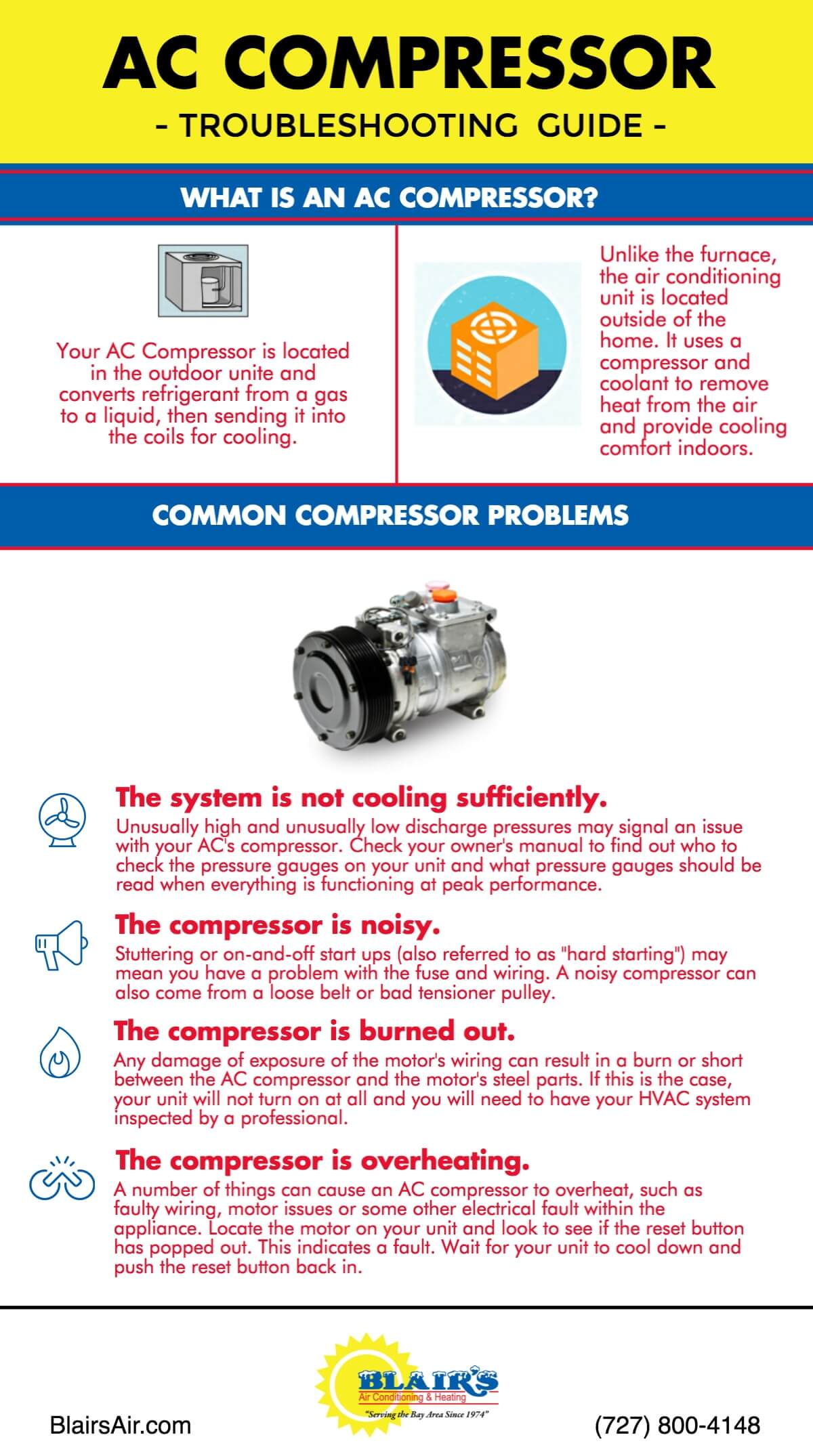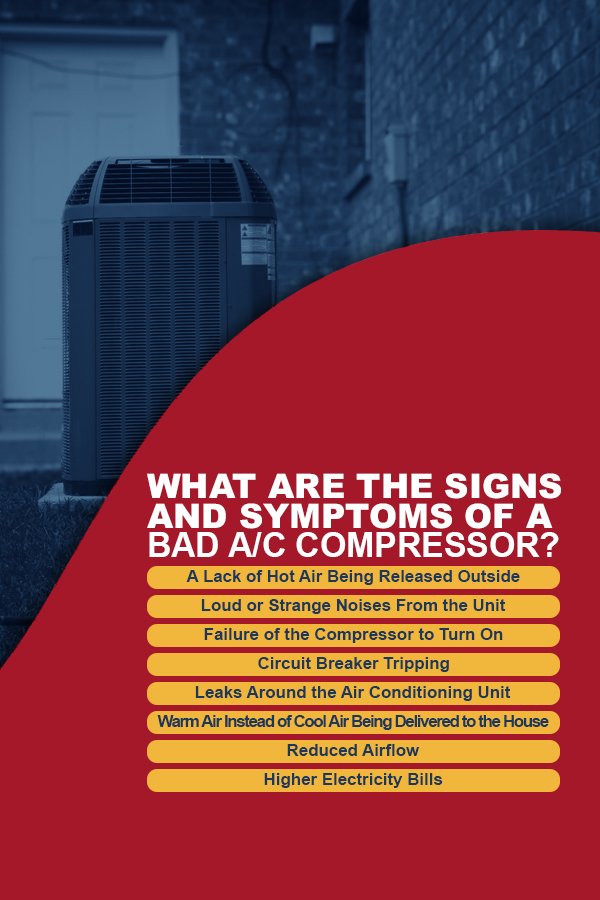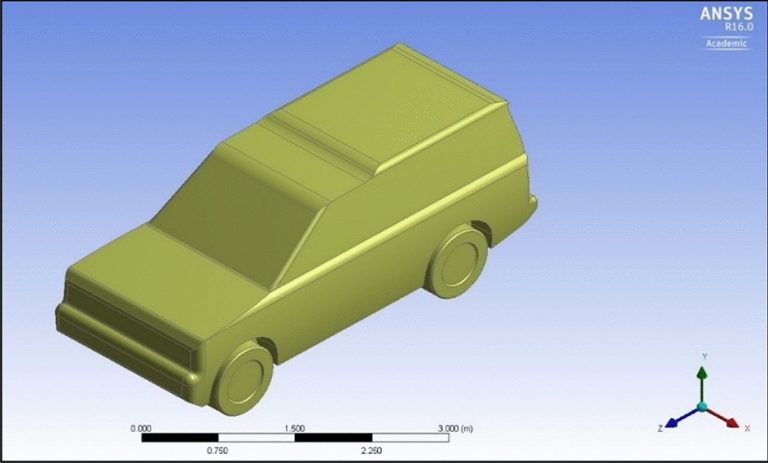Is Your Air Conditioner Compressor Bad? Find Out Now!
To know if an air conditioner compressor is bad, check for a lack of cool air and listen for loud noises. If the AC is not cooling properly or making unusual sounds, it may indicate a faulty compressor.
Regular maintenance and prompt diagnosis can prevent further damages or costly repairs. Always consult a professional HVAC technician for accurate assessment and repair of any compressor issues. Assessing the compressor regularly can ensure the efficient functioning of your air conditioning unit, keeping your indoor environment comfortable and cool during hot weather.
Trusting experts in the field can help you stay ahead of potential problems and maintain your AC system’s longevity and performance.

Credit: www.lakeelsinorehonda.com
Signs Of A Bad Air Conditioner Compressor
If you suspect that your air conditioner compressor is not functioning properly, it is essential to be aware of the signs of a bad compressor. Identifying these signs early can help prevent further damage and costly repairs. Below are some common indicators that may suggest your air conditioner compressor is malfunctioning.
Lack Of Cool Air
If your air conditioning system fails to produce cold air or if the air seems warmer than usual, it could be a red flag that your compressor is not working effectively. Ensure you address this issue promptly to avoid discomfort in your living space.
Loud Noise
A noisy compressor that produces unusual sounds like grinding, squealing, or knocking could indicate a potential problem. Ignoring these noises may lead to further damage, so it’s crucial to have the compressor inspected and repaired if necessary.
Warm Air From Vents
Feeling warm air instead of cool air coming from your vents could imply that your compressor is struggling to cool the air effectively. A thorough examination by a professional technician is advisable to diagnose and resolve this issue promptly.
Refrigerant Leakage
Leaking refrigerant around your air conditioning unit or visible signs of oil stains could be an indication of a compressor failure. It is crucial to address refrigerant leaks promptly to prevent further damage to your compressor and ensure optimal system performance.
Unusual Smells
Strange odors emanating from your air conditioning system could signal a potential issue with the compressor. If you notice any unusual smells like burning or musty odors, it is advisable to seek professional assistance to inspect and repair the compressor as needed.
How To Diagnose A Bad Ac Compressor
Checking Voltage
Check for voltage going to the compressor to ensure proper power supply.
Inspecting Fuses And Breakers
Inspect fuses and breakers for any signs of damage or tripping.
Inspecting And Testing Wiring
Examine the wiring for any frayed or damaged cables and test for continuity.
Isolating The Compressor
Disconnect the compressor from other components to isolate potential issues.
Testing Capacitor And Contactor
Test the capacitor and contactor for proper functioning to ensure efficient operation.
Replacing Components
If necessary, replace faulty components such as the compressor, capacitor, or contactor.
Symptoms Of A Failing Ac Compressor
When your air conditioner starts acting up, it’s crucial to recognize the symptoms of a failing AC compressor. Identifying these signs early on can save you from costly repairs and ensure the optimal functioning of your cooling system. Let’s explore the common symptoms that indicate a failing AC compressor.
Ticking Or Chattering Noise
If you notice a distinct ticking or chattering noise coming from your AC unit, it could be a sign of a failing compressor. These unusual sounds may indicate internal components are worn or damaged, requiring prompt attention from a professional HVAC technician.
Rattling Or Rumbling Noise
Another symptom of a failing AC compressor is the presence of rattling or rumbling noises during the operation of your air conditioning system. These noises often suggest loose or damaged parts within the compressor, necessitating immediate inspection and repair.
Reduced Airflow
A failing compressor can lead to reduced airflow from your AC vents, causing inadequate cooling in your living spaces. If you notice a decrease in the volume of air coming from your vents, it’s a strong indicator that your compressor may be in need of repair or replacement.
Refrigerant Leakage
Refrigerant leakage is a serious issue that can stem from a faulty compressor. If you observe any signs of refrigerant leaks around your AC unit, such as puddles or hissing sounds, it’s essential to address the problem promptly to prevent further damage to your cooling system.
Frequent Tripping Of Circuit Breaker
A failing AC compressor may lead to frequent tripping of the circuit breaker in your electrical panel. If you experience recurring instances of the circuit breaker tripping when your AC is running, it could be a clear indication of compressor issues that need immediate professional evaluation.
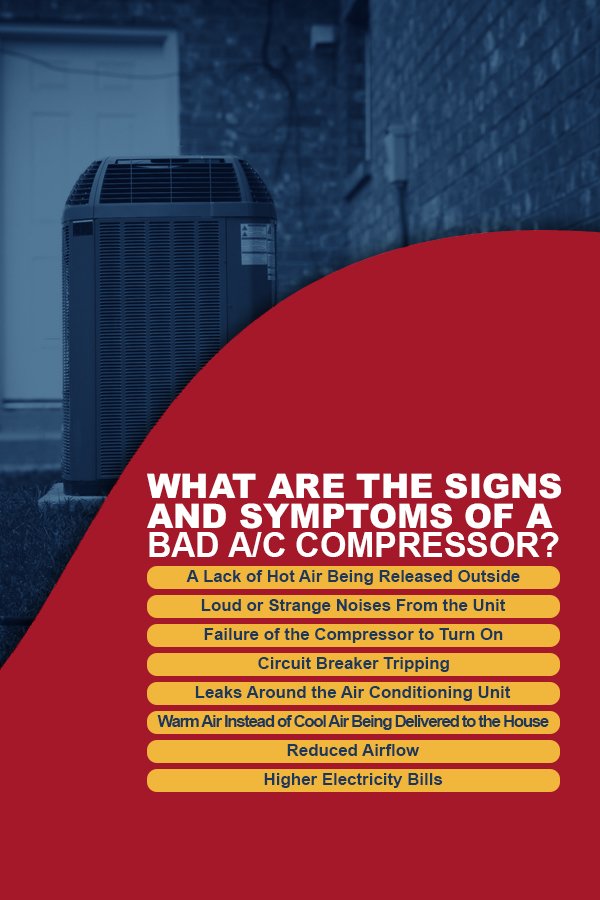
Credit: accontractors.com
Testing For A Burnt Out Compressor
When it comes to your air conditioner, a burnt out compressor can be a major issue. Not only does it affect the cooling performance of your AC, but it can also lead to costly repairs or even the need for a new unit. That’s why it’s important to know how to test for a burnt out compressor so you can address the problem as soon as possible. In this section, we will discuss three effective methods to help you determine if your air conditioner compressor is indeed bad.
Odor Test
An effective way to test if your air conditioner compressor is burnt out is by conducting an odor test. Those who have experienced a burnt-out compressor before will never forget the pungent smell that accompanies it. To perform this test:
- Turn off the power to your AC unit and unplug it from the wall.
- Remove any protective caps or covers from the compressor.
- Take a sniff near the compressor and pay attention to any unusual or burnt smells.
If you detect a strong burnt smell, it is a strong indication that your compressor is burnt out and needs to be repaired or replaced. In such cases, it is recommended to contact a professional HVAC technician to further diagnose the issue and provide the necessary solutions.
Resistance Test
Another method to test for a burnt out compressor is through a resistance test. To perform this test:
- Ensure the electrical power to your AC unit is turned off.
- Remove any protective cap or cover from the compressor.
- Using a multimeter set to the resistance mode, attach the leads to the terminal pairs on the compressor.
- Check the measurement displayed on the multimeter for each terminal pair.
If all the terminal pairs present the same measurement, it indicates that the compressor winding is intact. However, if there is a significant difference in the measurements or if any pair shows no resistance at all, it suggests that the compressor is burnt out and requires professional attention.
Auditory Signs
Apart from the odor and resistance tests, you can also identify a burnt out compressor through auditory signs. Listen for any unusual noises coming from the AC unit, such as grinding, squealing, or knocking sounds. These noises are indicative of a faulty compressor or a broken pulley. If you hear such sounds, it is recommended to contact a certified HVAC technician to assess the issue and provide the necessary repairs or replacements.
In conclusion, being able to test for a burnt out compressor is essential for maintaining the efficiency and longevity of your air conditioning system. By performing the odor test, resistance test, and paying attention to any auditory signs, you can quickly determine if your compressor needs attention. Remember, it is always advisable to consult a professional technician for accurate diagnosis and proper solutions.
How To Tell If Your Home Ac Compressor Is Bad
Is your home air conditioner not cooling your space as it should? Are you hearing strange noises coming from your AC unit? These could be signs that your home AC compressor is bad. The compressor is a crucial component of your air conditioning system, responsible for compressing refrigerant and circulating it through the system to cool the air. When it fails or malfunctions, it can severely impact the performance of your AC system.
Reduced Cooling Performance
If you’ve noticed a significant decrease in the cooling performance of your AC system, it could be an indication of a bad compressor. A faulty compressor may struggle to adequately compress the refrigerant, resulting in limited cooling capacity. This can cause your air conditioner to take longer to cool your home or not reach the desired temperature at all. Additionally, you might experience uneven cooling throughout your space, with certain areas being cooler than others.
Some other signs of reduced cooling performance include:
- Warm air blowing from the vents
- Inconsistent or fluctuating temperatures
- Poor airflow
Unusual Noises
If you hear strange noises coming from your AC unit, such as grinding, squealing, or knocking sounds, it’s likely that your home AC compressor is bad. These noises can indicate internal damage or wearing of components within the compressor. Over time, this can lead to a complete compressor failure if not addressed promptly.
It’s important to pay attention to any unusual noises coming from your AC unit, as they can provide valuable insights into the condition of your compressor and help you detect any issues early on.
Vibrations During Startup
Another telltale sign of a bad home AC compressor is the presence of vibrations during startup. When the compressor kicks in, it should operate smoothly without any noticeable vibrations or shaking. However, if you feel excessive vibrations or see the unit shaking, it could be an indicator of a compressor problem.
Vibrations during startup can be caused by various factors, including damaged motor mounts, worn-out compressor parts, or refrigerant leaks. If left untreated, these issues can worsen over time and lead to further damage to your AC system.
It’s essential to address any vibrations or shaking during startup promptly to prevent further damage and costly repairs.
In conclusion, understanding the signs of a bad home AC compressor is crucial for maintaining the optimal performance of your air conditioning system. If you’re experiencing reduced cooling performance, hearing unusual noises, or noticing vibrations during startup, it’s highly recommended to seek professional help to diagnose and fix any compressor issues.
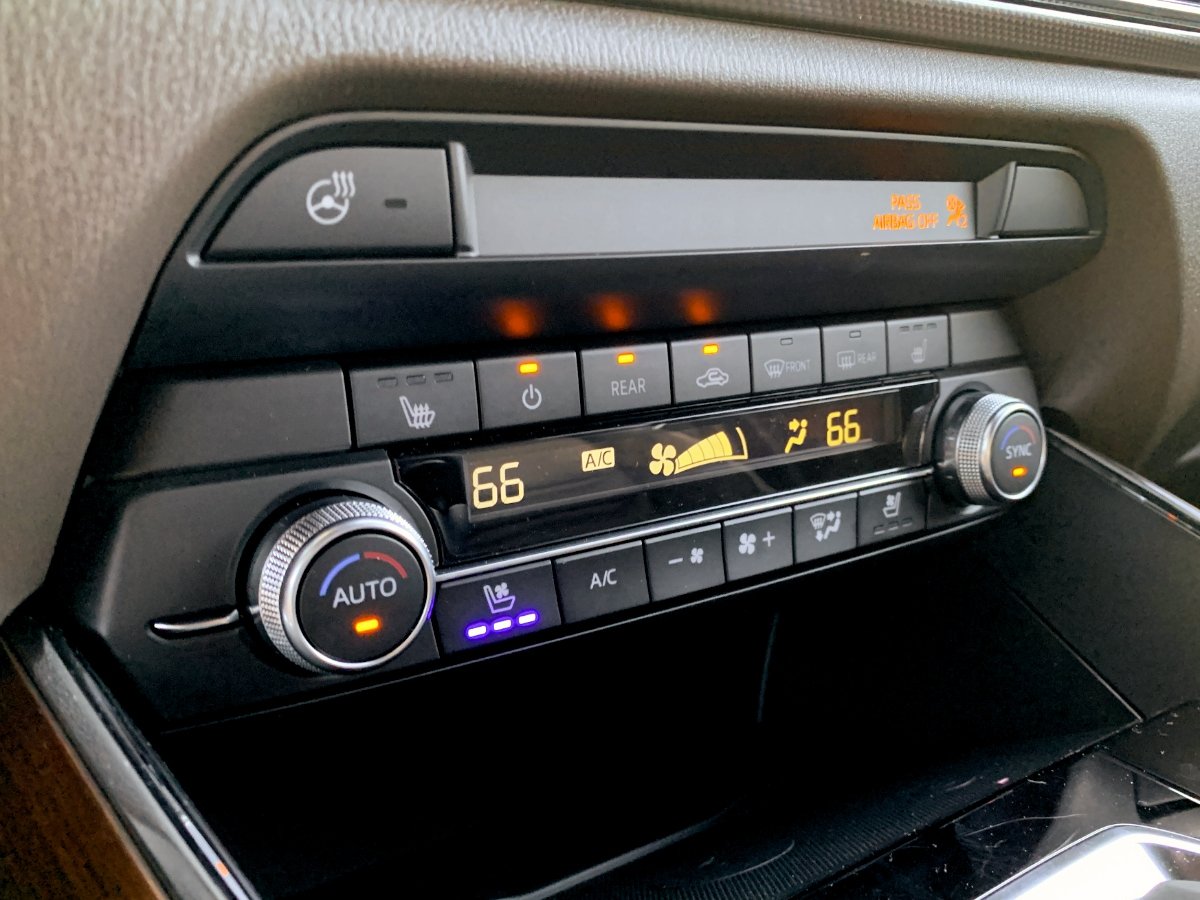
Credit: www.jdpower.com
Frequently Asked Questions On How To Know If Air Conditioner Compressor Is Bad
What Are The Symptoms Of A Bad Ac Compressor?
The symptoms of a bad AC compressor include lack of cool air and loud noises like grinding or squealing.
How Do I Know If My Air Conditioner Needs A New Compressor?
To determine if your air conditioner needs a new compressor, listen for odd noises, warm air from vents, and leaking refrigerant.
How Do I Test My Ac Compressor?
To test your AC compressor, check voltage, fuses, and wiring. Isolate the compressor, test terminals, and replace components if needed.
How Do You Tell If A Compressor Is Burnt Out?
A burnt-out compressor may produce a pungent odor when turned on. It may also cause ticking, rattling, or chattering noises and reduced airflow. Additionally, warm air and refrigerant leakage are signs the compressor may be bad. Use a multimeter to check for open windings and resistance.
Conclusion
In determining if your air conditioner compressor is bad, it’s essential to pay attention to symptoms such as warm air, unusual noises, and reduced cooling efficiency. It’s also imperative to conduct regular maintenance checks and seek professional help to diagnose and address potential issues.
Maintaining a well-functioning compressor is crucial for ensuring optimal air conditioning performance and comfort.

